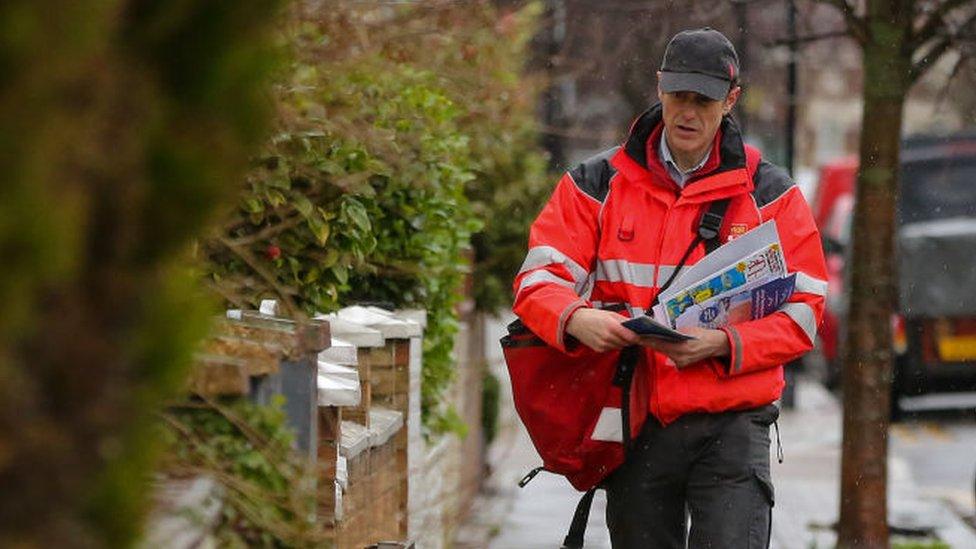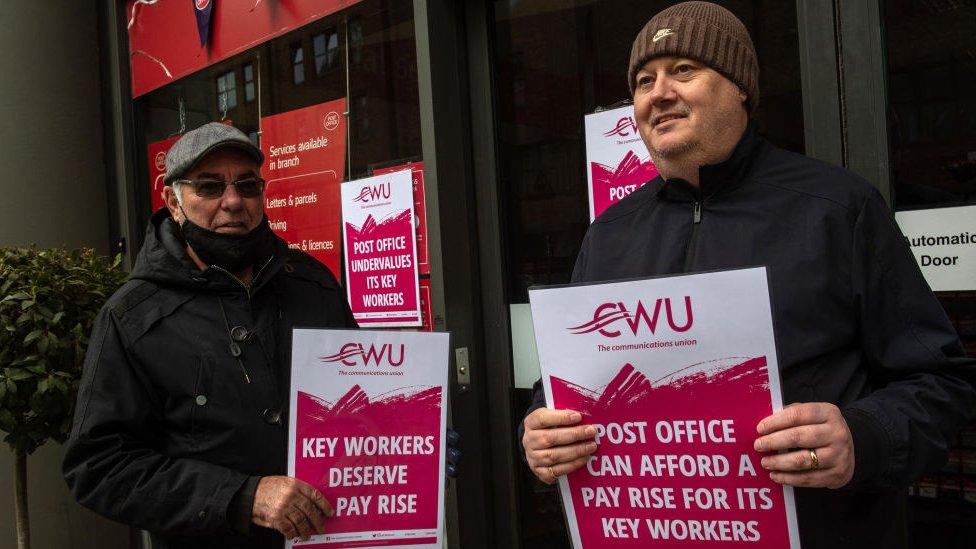Royal Mail workers to vote on strike over pay
- Published
- comments

More than 115,000 Royal Mail workers will begin voting on Tuesday over whether to go on strike over pay.
Ballot papers will be dispatched to the Communication Workers Union (CWU) members, with the result on 19 July.
If workers back action, the CWU says it could amount to the biggest ever strike by its members. Royal Mail says there are "no grounds" for strike action.
The CWU is the latest of several unions to ballot for strikes in recent weeks as the cost of living soars.
Prices are rising at their fastest pace for 40 years, with UK inflation at 9.1%, the highest rate since March 1982.
Higher costs for fuel, energy and good are biting into household budgets and workers and unions are pushing for pay rises to cope with them.
But the government has warned against employers handing out big increases in salaries over fears of a 1970s style "inflationary spiral", where firms hike wages and then pass the cost on to customers through higher prices.
Britain's railways were disrupted when thousands of RMT Union members walked out last week and hundreds of British Airways workers at Heathrow Airport have also voted to go on strike over their wages.
Separately, 114 Post Offices are to be closed on 11 July when workers strike over pay.
CWU deputy general secretary Terry Pullinger said in a video posted on Twitter that the union wanted an "inflation-based, no-strings pay award" for its Royal Mail members.
"The company has imposed a 2% pay award, miles away from where inflation is, totally inadequate," he said.
The CWU said the pay award was "despite previous agreements that no immediate executive action would be taken over pay".
"Throughout this entire dispute, Royal Mail management have conducted themselves insultingly and disrespectfully to key workers," Mr Pullinger said.
"Their conduct, and particularly the imposition of such an aggressive pay offer, has eroded trust among loyal employees."
But Royal Mail said it believed there were "no grounds for industrial action".
"We offered a deal worth up to 5.5% for CWU grade colleagues, the biggest increase we have offered for many years, which was rejected by the CWU," a spokesman said.
The company said further talks were scheduled with the union this week and it hoped an agreement could be reached.

A summer of strikes?

Confirmed strikes
2 July - Aslef Union (Greater Anglia)
11 July - Communication Workers Union (Post Office staff)
13-14 July - Aslef Union (London trams)
18-22 July - The Criminal Bar
TBC - GMB Union (Heathrow staff)
Ballots on possible strike action
29 June - Unite Union (Royal Mail staff)
11 July - TSSA Union (Network Rail)

Higher costs
Chinelo Awa, founder of Good Cake Day, relies mostly on Royal Mail to deliver her brownies and cookies to customers.
She told the BBC's Wake Up to Money programme that any strike action would affect her business as she would most likely have to use a more expensive courier.
Ms Awa said: "I want everyone to receive a fair pay, so from a personal view I sympathise, but as a business owner there is a need to take a sit back and go OK, what is this going to do? Is this a busy period? Is this going to impact us?
"Sometimes we can be really busy and we are sending out upwards of a 100 brownies orders in a week. If that is happening and we are relying on Royal Mail for that then we go for courier companies but that typically means higher costs."
Ms Awa, whose shop is based in Battersea, London, said where Royal Mail would charge £5.05 for next day recorded delivery, a courier would charge "upwards of £6.58 to about £8".
"In isolation that doesn't sound like a lot of money but then when you multiply it by a 100 it starts to add up," she said.
Related topics
- Published27 June 2022

- Published23 June 2022

- Published15 June 2022
